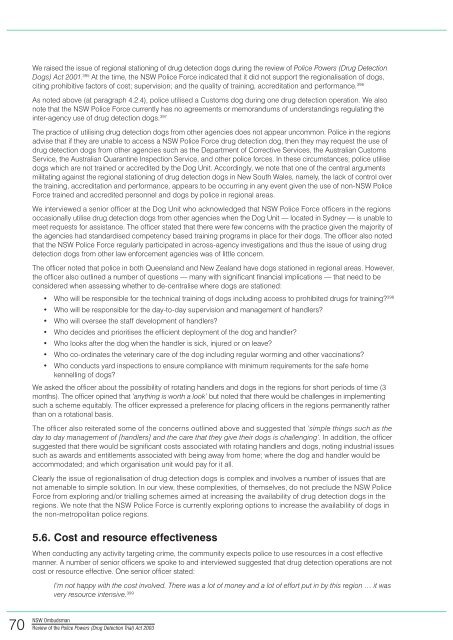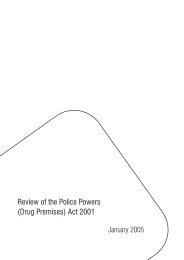Review of the Police Powers (Drug Detection Trial) Act 2003 - NSW ...
Review of the Police Powers (Drug Detection Trial) Act 2003 - NSW ...
Review of the Police Powers (Drug Detection Trial) Act 2003 - NSW ...
Create successful ePaper yourself
Turn your PDF publications into a flip-book with our unique Google optimized e-Paper software.
We raised <strong>the</strong> issue <strong>of</strong> regional stationing <strong>of</strong> drug detection dogs during <strong>the</strong> review <strong>of</strong> <strong>Police</strong> <strong>Powers</strong> (<strong>Drug</strong> <strong>Detection</strong><br />
Dogs) <strong>Act</strong> 2001. 395 At <strong>the</strong> time, <strong>the</strong> <strong>NSW</strong> <strong>Police</strong> Force indicated that it did not support <strong>the</strong> regionalisation <strong>of</strong> dogs,<br />
citing prohibitive factors <strong>of</strong> cost; supervision; and <strong>the</strong> quality <strong>of</strong> training, accreditation and performance. 396<br />
As noted above (at paragraph 4.2.4), police utilised a Customs dog during one drug detection operation. We also<br />
note that <strong>the</strong> <strong>NSW</strong> <strong>Police</strong> Force currently has no agreements or memorandums <strong>of</strong> understandings regulating <strong>the</strong><br />
inter-agency use <strong>of</strong> drug detection dogs. 397<br />
The practice <strong>of</strong> utilising drug detection dogs from o<strong>the</strong>r agencies does not appear uncommon. <strong>Police</strong> in <strong>the</strong> regions<br />
advise that if <strong>the</strong>y are unable to access a <strong>NSW</strong> <strong>Police</strong> Force drug detection dog, <strong>the</strong>n <strong>the</strong>y may request <strong>the</strong> use <strong>of</strong><br />
drug detection dogs from o<strong>the</strong>r agencies such as <strong>the</strong> Department <strong>of</strong> Corrective Services, <strong>the</strong> Australian Customs<br />
Service, <strong>the</strong> Australian Quarantine Inspection Service, and o<strong>the</strong>r police forces. In <strong>the</strong>se circumstances, police utilise<br />
dogs which are not trained or accredited by <strong>the</strong> Dog Unit. Accordingly, we note that one <strong>of</strong> <strong>the</strong> central arguments<br />
militating against <strong>the</strong> regional stationing <strong>of</strong> drug detection dogs in New South Wales, namely, <strong>the</strong> lack <strong>of</strong> control over<br />
<strong>the</strong> training, accreditation and performance, appears to be occurring in any event given <strong>the</strong> use <strong>of</strong> non-<strong>NSW</strong> <strong>Police</strong><br />
Force trained and accredited personnel and dogs by police in regional areas.<br />
We interviewed a senior <strong>of</strong>ficer at <strong>the</strong> Dog Unit who acknowledged that <strong>NSW</strong> <strong>Police</strong> Force <strong>of</strong>ficers in <strong>the</strong> regions<br />
occasionally utilise drug detection dogs from o<strong>the</strong>r agencies when <strong>the</strong> Dog Unit — located in Sydney — is unable to<br />
meet requests for assistance. The <strong>of</strong>ficer stated that <strong>the</strong>re were few concerns with <strong>the</strong> practice given <strong>the</strong> majority <strong>of</strong><br />
<strong>the</strong> agencies had standardised competency based training programs in place for <strong>the</strong>ir dogs. The <strong>of</strong>ficer also noted<br />
that <strong>the</strong> <strong>NSW</strong> <strong>Police</strong> Force regularly participated in across-agency investigations and thus <strong>the</strong> issue <strong>of</strong> using drug<br />
detection dogs from o<strong>the</strong>r law enforcement agencies was <strong>of</strong> little concern.<br />
The <strong>of</strong>ficer noted that police in both Queensland and New Zealand have dogs stationed in regional areas. However,<br />
<strong>the</strong> <strong>of</strong>ficer also outlined a number <strong>of</strong> questions — many with significant financial implications — that need to be<br />
considered when assessing whe<strong>the</strong>r to de-centralise where dogs are stationed:<br />
• Who will be responsible for <strong>the</strong> technical training <strong>of</strong> dogs including access to prohibited drugs for training? 398<br />
• Who will be responsible for <strong>the</strong> day-to-day supervision and management <strong>of</strong> handlers?<br />
• Who will oversee <strong>the</strong> staff development <strong>of</strong> handlers?<br />
• Who decides and prioritises <strong>the</strong> efficient deployment <strong>of</strong> <strong>the</strong> dog and handler?<br />
• Who looks after <strong>the</strong> dog when <strong>the</strong> handler is sick, injured or on leave?<br />
• Who co-ordinates <strong>the</strong> veterinary care <strong>of</strong> <strong>the</strong> dog including regular worming and o<strong>the</strong>r vaccinations?<br />
• Who conducts yard inspections to ensure compliance with minimum requirements for <strong>the</strong> safe home<br />
kennelling <strong>of</strong> dogs?<br />
We asked <strong>the</strong> <strong>of</strong>ficer about <strong>the</strong> possibility <strong>of</strong> rotating handlers and dogs in <strong>the</strong> regions for short periods <strong>of</strong> time (3<br />
months). The <strong>of</strong>ficer opined that ‘anything is worth a look’ but noted that <strong>the</strong>re would be challenges in implementing<br />
such a scheme equitably. The <strong>of</strong>ficer expressed a preference for placing <strong>of</strong>ficers in <strong>the</strong> regions permanently ra<strong>the</strong>r<br />
than on a rotational basis.<br />
The <strong>of</strong>ficer also reiterated some <strong>of</strong> <strong>the</strong> concerns outlined above and suggested that ‘simple things such as <strong>the</strong><br />
day to day management <strong>of</strong> [handlers] and <strong>the</strong> care that <strong>the</strong>y give <strong>the</strong>ir dogs is challenging’. In addition, <strong>the</strong> <strong>of</strong>ficer<br />
suggested that <strong>the</strong>re would be significant costs associated with rotating handlers and dogs, noting industrial issues<br />
such as awards and entitlements associated with being away from home; where <strong>the</strong> dog and handler would be<br />
accommodated; and which organisation unit would pay for it all.<br />
Clearly <strong>the</strong> issue <strong>of</strong> regionalisation <strong>of</strong> drug detection dogs is complex and involves a number <strong>of</strong> issues that are<br />
not amenable to simple solution. In our view, <strong>the</strong>se complexities, <strong>of</strong> <strong>the</strong>mselves, do not preclude <strong>the</strong> <strong>NSW</strong> <strong>Police</strong><br />
Force from exploring and/or trialling schemes aimed at increasing <strong>the</strong> availability <strong>of</strong> drug detection dogs in <strong>the</strong><br />
regions. We note that <strong>the</strong> <strong>NSW</strong> <strong>Police</strong> Force is currently exploring options to increase <strong>the</strong> availability <strong>of</strong> dogs in<br />
<strong>the</strong> non-metropolitan police regions.<br />
5.6. Cost and resource effectiveness<br />
When conducting any activity targeting crime, <strong>the</strong> community expects police to use resources in a cost effective<br />
manner. A number <strong>of</strong> senior <strong>of</strong>ficers we spoke to and interviewed suggested that drug detection operations are not<br />
cost or resource effective. One senior <strong>of</strong>ficer stated:<br />
I’m not happy with <strong>the</strong> cost involved. There was a lot <strong>of</strong> money and a lot <strong>of</strong> effort put in by this region … it was<br />
very resource intensive. 399<br />
70<br />
<strong>NSW</strong> Ombudsman<br />
<strong>Review</strong> <strong>of</strong> <strong>the</strong> <strong>Police</strong> <strong>Powers</strong> (<strong>Drug</strong> <strong>Detection</strong> <strong>Trial</strong>) <strong>Act</strong> <strong>2003</strong>

















